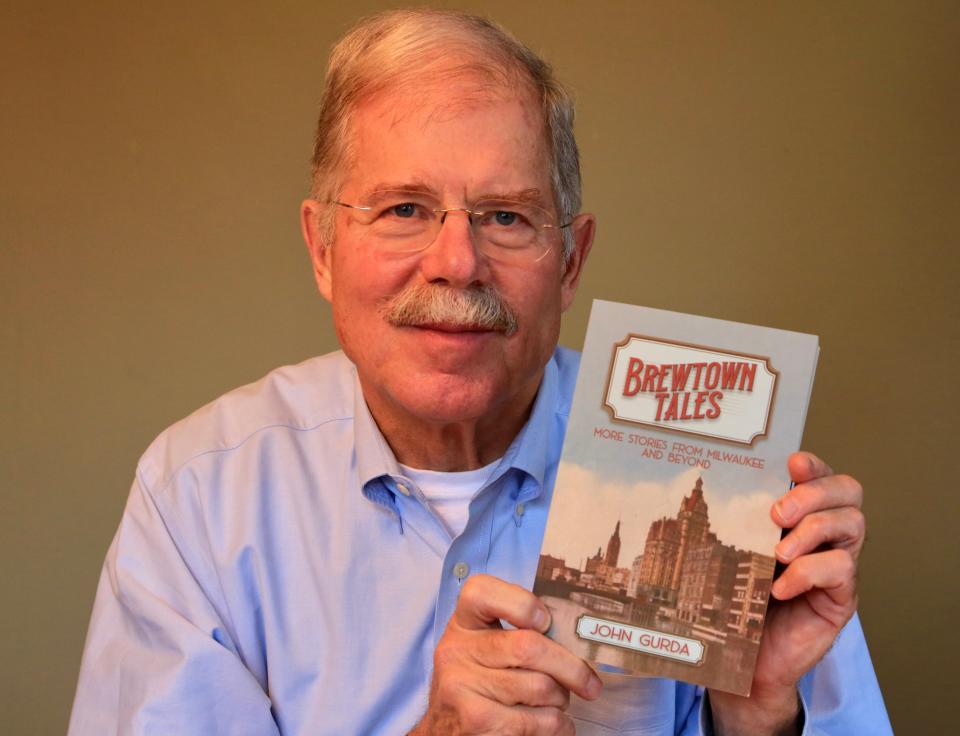John Gurda says farewell after 29 years of writing about our history
Here ends, at least on a regular basis, one of the longest-running columns in the history of Milwaukee newspapering. For nearly 29 years, I’ve used this space to build monthly bridges between past and present, most often sketching in the historical context for the newest landmark, the latest political shift, or the most recent crisis. In other columns, I’ve simply told the stories of local people and places I thought you’d find interesting.
It’s been a privilege to follow in the footsteps of earlier columnists who trod the same turf, including Russell Austin, Robert Wells, and the matchless Jay Scriba, but a combination of factors — deadline fatigue, advancing age, the retirement of Ideas Lab Editor David Haynes, and the desire to pursue other writing projects — has persuaded me to hang it up. I’m sure there will still be occasional essays that demand to be written, but, as any number of aging athletes will tell you, it's best to quit the game while you can still see the ball.
I won’t leave you without reading material. In fact, I’ve put together a whole book’s worth. “Brewtown Tales: More Stories from Milwaukee and Beyond,” which was just published by the Wisconsin Historical Society Press, contains nearly 500 pages of my best columns and assorted other writings. It’s the equivalent of months of Sundays, but more on that later.

The history column has a history of its own, of course. In 1994, the Milwaukee Journal was launching a feature called “Our Town,” and the editors invited me to submit stories about our community’s past. My first contribution, a short piece describing the old Falk brewery, appeared on March 6, 1994. Barely a year later, the afternoon Journal and the morning Sentinel merged to form, naturally, the Milwaukee Journal SentineI.“Our Town” didn’t survive the move, but the history column did, and it’s been a staple of the op-ed section ever since, appearing on the first Sunday of each month in Crossroads for many years and currently in Ideas Lab.
Why such longevity? Because I wrote just once a month. My friends and colleagues, Dennis McCann and Jim Stingl, both of them full-time employees, filed three columns a week, Dennis for 25 years and Jim for 20. That adds up to about 3,750 columns for the paper’s former farming and travel writer and 3,000 for its finest human-interest reporter. My output over nearly three decades: 349 essays.
Why didn’t I write more often? Because I couldn’t afford to. My typical column was research-intensive; I could easily spend three or four days crafting an essay that a 16-year-old could polish off in 10 minutes, and I received the same flat rate for decades regardless of how much time I’d spent. Freelance writers get paid like adjunct college instructors or part-time bartenders; the income was supplemental at best.
But there were ample rewards beyond the financial. For 29 years, when long projects got longer, I had the regular satisfaction of finishing something. Researching and writing “The Making of Milwaukee,” for instance, took four full years, enough time to earn a high school diploma or a college degree, without summers off. It was a blessed relief to switch from the marathon of a book to the sprint of a column once a month. Doing the necessary research certainly enlarged my own knowledge base. You never know how much you know — or don’t know — until you try to write it down.
The column also gave me a chance to vent my political spleen on occasion. Until the newspaper temporarily lost its taste for commentary, I wrote a number of political essays that slammed Gov. Scott Walker, in particular, as a destructive departure from Wisconsin’s core traditions. One 2016 story generated more than 1,200 comments, some passionately supportive but just as many venomously opposed. That divide itself was stark evidence of our democracy’s dysfunction, evidence that led to another column on “the missing middle,” which is included in “Brewtown Tales.”
Perhaps the column’s greatest reward has been the simple joy of expression. Writing is by far the hardest thing I know how to do, but having written is easily my most singular pleasure. I still smile when I revisit my comparison of Hank the Dog with Gertie the Duck, and re-reading my account of a fall drive down Highway 12, the anti-freeway, takes me right back to that misty day in west-central Wisconsin. I have labored to make each essay its own small world, self-contained and carefully constructed, that invites readers to enter and make themselves at home.
Some columns, I hasten to add, seem almost unrecognizable today. Did I really write about the McCaughey septuplets in 1997 or weigh in on the proposed Blue Shirt sculpture in 2001? Does anyone remember when the battleship USS Des Moines was proposed as a permanent lakefront “attraction”? Or that a seven-footer from China named Yi Jianlian once played for the Bucks? But that’s the nature of history. The past never really disappears, but the present can overwrite some of its elements so completely that recovering them is a challenge.
The history column has provided me, finally, with some professional satisfactions. I never missed a deadline in 29 years, and I consistently submitted clean copy. Nor was I ever at a loss for a subject, although that shouldn’t be particularly hard when you need only a dozen each year. Some topics required a fuller treatment, but I regularly hit a mark of 1,200 words per column, a limit that came to seem natural.
And now the book. “Brewtown Tales” contains 80 of my best essays, painstakingly updated and “evergreened” to make them less time-bound. Not all are newspaper columns; the book includes a few longer essays and even one story from an airline magazine. It follows “Cream City Chronicles,” a 2007 collection also published by the Wisconsin Historical Society Press, but the new book surpasses its predecessor in both length and breadth. Think of “Brewtown Tales” as Gurda’s Greatest Hits, a medley that includes the biography of a bridge, a requiem for a union, odes to both autumn and spring, a poem about aging, tales of two shipwrecks, a frank take on segregation, a visit to a junkyard, and memories of the summer of 1968, among many other things.

You could make one of the planet’s wealthiest men, Jeff Bezos, even richer by ordering the book from Amazon, but you could also keep the money in Wisconsin by patronizing a local bookstore or the gift shops at the Milwaukee County Historical Society or Historic Milwaukee, Inc. You’ll keep the circle especially tight if you order directly from the publisher: https://shop.wisconsinhistory.org/brewtown-tales.
I think of “Brewtown Tales” as a personal testament, an open book that reveals my passions, my values, and sometimes my slightly off-center sense of humor. It’s also a late milepost in a long journey. What I feel most strongly as I reach the finish line is gratitude: to the Journal Sentinel for providing me with a forum, to my editors for their support and occasionally their indulgence, and most of all to you, my readers. It’s been a long journey, and I hope you’ve found it as engaging and even enlightening as I have. Thanks for your company.
Editor's note: John Gurda, a Milwaukee historian, is the author of several books including his latest, "Brewtown Tales," published by the Wisconsin Historical Society Press. While John's column will no longer appear monthly in the Journal Sentinel, expect to see occasional essays from him in the Ideas Lab. And a personal note: We'll miss John's elegant and thoughtful writing; he helps us cement the bonds of past and present with compassion, wit and intelligence no matter his subject. And, as he noted, he never missed a deadline. Good luck, John. You can reach him at mail@johngurda.com.
More:A new PBS documentary chronicles centuries of change on Milwaukee's Jones Island
More:Hidden in plain site in Milwaukee: 14 city secrets everyone should see and know about
This article originally appeared on Milwaukee Journal Sentinel: John Gurda says farewell after 29 years of writing our history

